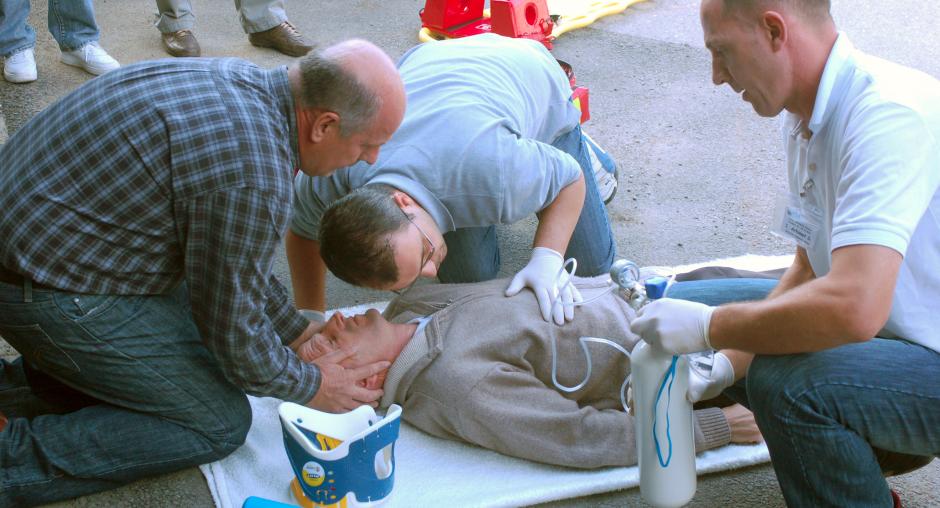OSCE facilitates training for Kosovo's emergency service
The paramedics of the Kosovo emergency service are the first people on the scene to help those injured in accidents. Spread throughout Kosovo as part of main family health care centres, the task of these doctors and nurses is to provide adequate pre-hospital treatment for injured during the 'golden hour' - the crucial 60 minutes from the moment the accident happens until the injured reach the surgery room.
Although trained paramedics are crucial for the effective functioning of the emergency service, systematic training for the emergency staff has been lacking.
An analysis of pre-hospital facilities done by the OSCE in 2009 identified the lack of practical training in advanced life support and rescue procedures at the scene as one of their main problems.
"The fact that none of the doctors in our team is a specialist in emergency medicine makes the need for training imperative," says Dr. Faton Xhaka from the Emergency Service of Podujevë/Podujevo, a participant in the first OSCE-supported training course in November 2009. The centre in Podujevë/Podujevo, 35 km north of Prishtinë/Pristina, covers a region with over 130,000 inhabitants.
Some of the emergency service staff received trained in the past, but according to Hatab Prekazi from the OSCE, such training was delivered by different organizations and was not systematic or standardized. An analysis done by OSCE in co-operation with the World Health Organization and Kosovo Ministry of Health has shown that International Trauma Life Support (ITLS) training is the most appropriate model to conduct future standardized training in Kosovo. The ITLS is a global organization based in Chicago, USA, and is dedicated to preventing death and disability from trauma through education and emergency trauma care.
The training courses
As there is no ITLS centre in Kosovo, the OSCE facilitated a trip to Belgrade for 15 paramedics from different emergency centres throughout Kosovo. The first three-day training course was conducted in November 2009 and provided the participants with the theoretical knowledge and hands-on skills on how to best treat trauma victims.
Out of the group, the seven best trainees were chosen to become potential instructors, pending one more training and evaluation by ITLS instructors.
"We work in difficult conditions, with minivans improvised as ambulances, and often lack the necessary equipment," says Dr. Xhaka, "We need to make the system functional, and for that we need trained staff, ambulance vehicles and equipment, like prosthetics, splint set, stretchers, neck braces," he says. "In serious cases, 70% of the treatment of the injured is done in the ambulance vehicles while the biggest mistakes are made during transportation, so trained paramedics will decrease the invalidity rate."
In an effort to make the training of more doctors and nurses possible, in June 2010 the OSCE organized additional training in Vushtrri/Vucitrn with lecturers from ITLS centre in Croatia. The course was offered to another 30 paramedics, and was divided into an Instructor Course, for those already chosen as potential instructors, and a Provider Course for those receiving training for the first time.
"On the first day of training, the seven candidates from the first group went through the Instructor Course, by lecturing to the new group of trainees together with the ITLS instructors from Croatia and Serbia, as a way to evaluate their skills as new instructors," Prekazi says. "Having successfully passed this phase, they will undergo an examination to become certified instructors," he adds.
An additional five members of the Kosovo police operational team trained in basic pre-hospital care also took part in the second training course.
Future plans
Following the success of the first two training courses, a third course for another 20 paramedics began last month in Vushtrri/Vucitrn. "Our team responded to 34,000 cases during 2009 alone, so the more properly trained staff we have, the more chances we have to live up to our patients' expectations," says Dr. Xhaka.
After the third training, the Emergency Institute in Prishtinë/Pristina will take over organizing and hosting future training sessions. Its director, Dr. Haki Dragusha, himself a trainee of the second group, and together with Dr. Xhaka a potential future instructor, says his Institute is ready for the takeover.
"We need an internationally standardized system of treating the injured," he says. "Our institute will be able to handle future training, and although the training is not obligatory, my staff are eager to participate as their job is to help others and they want to do it as best as they can."

